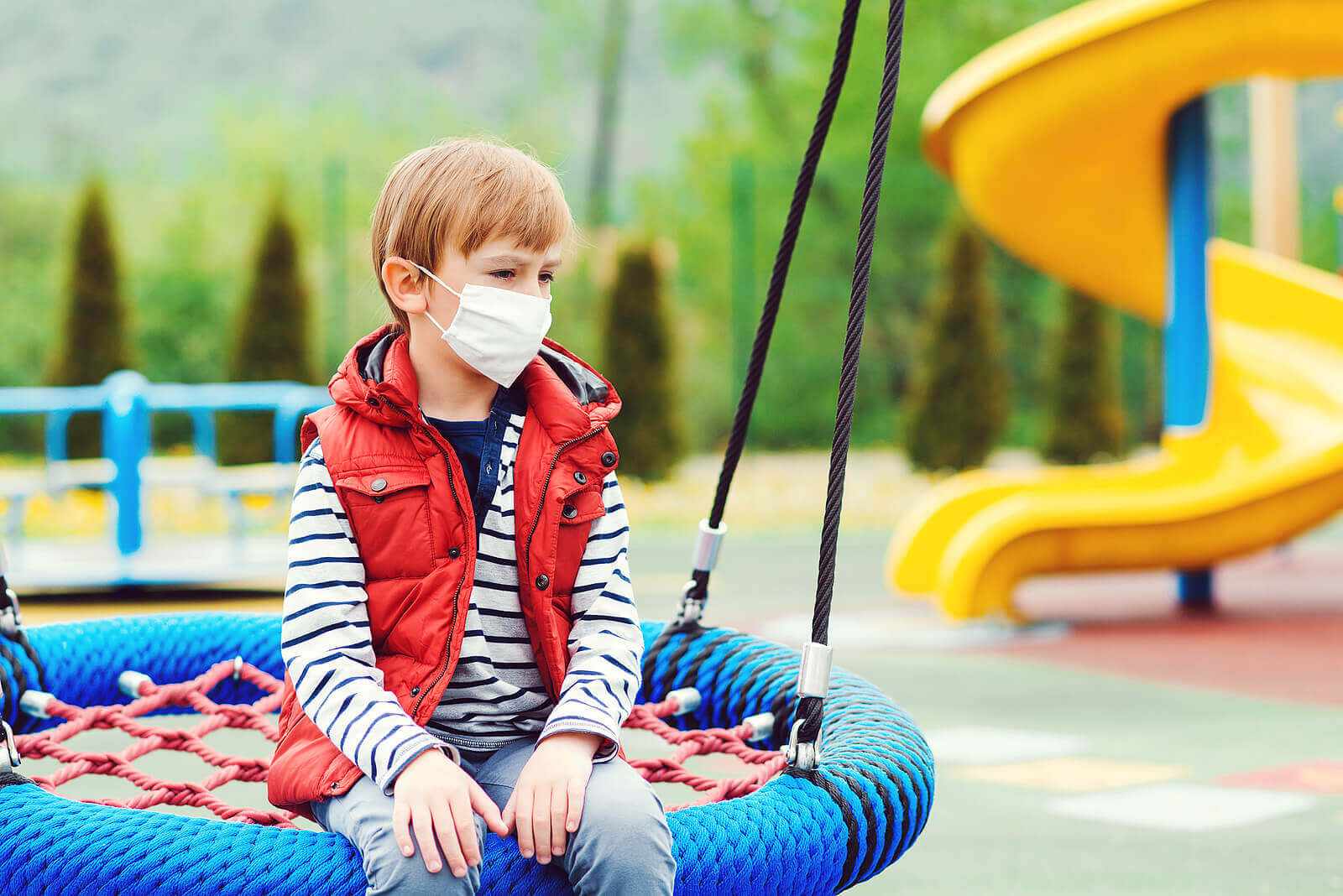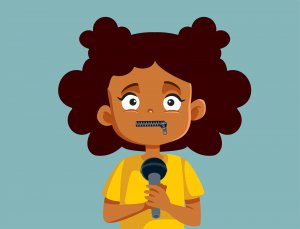What is Selective Mutism?
Selective Mutism (SM) is an anxiety disorder that is characterized by an inability to speak or communicate in certain situations. It is usually first diagnosed during childhood.
Children with selective mutism appear to develop typically and speak normally in certain situations. However, they fail to speak in public situations where speaking is an expectation. For example, in the classroom or at a family event. Children with selective mutism are quite capable of talking in situations where they feel comfortable. Maybe this is at home or with a few close friends. However, their anxiety can make it uncomfortable, even impossible, for them to speak in other settings. They might have something they really want to say but remain unresponsive and mute.
Children with selective mutism can be seen as fun-loving, dramatic, and talkative children within their homes. However, at school or at a birthday party it can be a different story. Silent behavior by a child with selective mutism can be mistaken for being rude, non-compliant, and even spoilt. The reality is that the child is more often frozen with fear and anxiety, and unable to speak in that situation. Even though they might want to communicate.
Symptoms of Selective Mutism
Selective mutism has been described as being a spectrum. Your child might stand motionless and frozen with fear when expected to answer a question. Or they might nod their head and point as a way to communicate. They may even whisper a response. Some children can get by with minimal responses. However, they will never initiate a conversation or advocate for their needs (e.g. ask to go to the bathroom in school).
Do you believe your child might be struggling with selective mutism?
Look for the following symptoms of selective mutism if you do:
- Inability to speak in school and other specific social situations
- Speaking easily in certain situations, e.g. at home or with familiar people, but not in others
- Use of nonverbal communication to express needs, e.g. nodding head, pointing
- Being shy, displaying a fear of people, a reluctance to speak
- A desire to speak held back by anxiety or fear
- Avoiding eye contact, fidgeting, lack of expression when in a feared situation.
By engaging in these behaviors, your child is actually being self-protective in a situation that is causing intense anxiety. Not everyone you meet will understand this. Some people will believe your child is being defiant or rude. Your child is neither of these. Nor are they being shy. The shy child will eventually warm up, relax, and communicate normally. The child with selective mutism might look as though they are warming up, but will in fact, remain mute. If you think that your child has selective mutism, it is important to know that they won’t just grow out of it or speak when they are ready. It might be time to seek out a caring child therapist who can effectively diagnose your child and help you with treatment in a supportive way.
Diagnosis
Selective mutism is now classified as an anxiety disorder, but this didn’t happen until the Diagnostic and Statistical Manual of Mental Disorders, Fifth Edition was published in 2013. The term “selective” emphasizes that children are not choosing to be silent, but rather that they are too afraid to speak.
The first step in helping your child, if you believe they are struggling with selective mutism, is to speak with their pediatrician. They will probably recommend your child see a mental health professional who specializes in selective mutism and child therapy for anxiety. When a child psychologist or therapist is diagnosing selective mutism, the main criterion is that there must be a:
“consistent failure to speak in specific social situations in which there is an expectation for speaking (e.g. at school) despite speaking in other situations.” (DSM-5, 2013).
If your child displays this primary symptom, ask yourself the following questions;
- Does your child speak at school or when they are on play-dates?
- Has the lack of language been present for more than one month and surpassed the first month of school?
- Does your child understand spoken language?
- Do they speak normally in some situations e.g. in the home?
- Does your child have a communication disorder that might prevent them from speaking?
If your responses to these questions are causing you concern, talk it over with your child’s pediatrician or reach out to me at Brave Minds Psychological Services. I am happy to speak with parents about selective mutism.
What Else Could It Be?
Sometimes selective mutism can be confused with other diagnoses. You see your child struggling and ask yourself “what could it be?” Take some time and look at the behaviors they are presenting with. This will help when you seek out treatment and allow the professional you are working with to rule out other possibilities.

- Communication disorders – such as stuttering (childhood-onset fluency disorder).
- Neurodevelopmental disorders – such as autism or severe intellectual disability.
- Social anxiety disorder – although quite often children are diagnosed with both.
One of the main differences between the aforementioned diagnoses and selective mutism is that with selective mutism your child will speak in some social settings, but not in others.
Selective mutism can also coexist with other anxiety disorders. The most common is social anxiety disorder, followed by separation anxiety disorder, and then specific phobias.
Causes
Selective mutism continues to be quite rare. It affects approximately 1% of children seen in behavioral healthcare settings. As a result, it can be difficult to understand the risk factors associated with selective mutism. It was thought that trauma, upheaval, or childhood abuse were the causes of selective mutism. Research now shows that there is a strong relationship to severe social anxiety. A hereditary or genetic component is likely. It is unlikely that there is one single cause. Temperament and environment may also be potential contributors to selective mutism. If your child is behaviorally inhibited or has reduced opportunities for social interactions, that might play a role too.
When to Seek Child Therapy for Anxiety-Related Selective Mutism
Early intervention for selective mutism with child therapy for anxiety is extremely important. The longer the child engages in silent behavior, the harder it is to treat. Identifying, diagnosing, and treating selective mutism as early as possible is key to helping your child progress. If you have observed your child being silent for two months or more, then it might be time to consider reaching out to a caring child psychologist or therapist.
Interested in Child Therapy?
Contact us for a free video consultation.
(908) 224-7727 or Connect Now
Begin Child Therapy for Anxiety for Selective Mutism in Scotch Plains, NJ and Branchburg, NJ
At Brave Minds Psychological Services in Scotch Plains, NJ selective mutism is only one of many things that we can help with in child therapy for anxiety. Let our skilled and caring child therapists provide a safe and comfortable therapy experience right here in New Jersey. To begin counseling, there are a few simple steps:
- Connect with Brave Minds Psychological Services today.
- Get your questions answered in a free phone consultation call with one of our compassionate child therapists.
- Help your child move forward with their brave, beautiful life.
Other Therapy Services At Brave Minds Psychological Services
We offer a variety of mental health services for children, teens, adults and families at Brave Minds Psychological Services. Our licensed therapists and counselors are committed to helping you get on the right path to healing and wholeness. Our therapeutic services for children and teens include therapy for children, anxiety treatment for children, child sexual abuse therapy, therapy for teens, anxiety treatment for teens, teen social phobia therapy. We also offer adult mental health services including adult anxiety counseling, couples counseling, counseling for parents, postpartum counseling, birth trauma therapy, and sexual assault counseling for adults. We also have a blog where we write about a variety of different mental health subjects. If you’re interested in learning more about our services here at Brave Minds Psychological Services or online, please contact our Scotch Plains counseling office! Proud to serve Fanwood, Westfield, Cranford, New Providence, and surrounding areas.





One thought on “Could Your Child Be Experiencing Selective Mutism?”
Comments are closed.